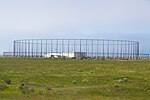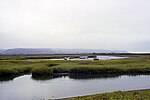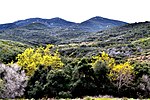Imperial Beach, California
Beaches of San Diego County, CaliforniaBeaches of Southern CaliforniaCities in San Diego County, CaliforniaHistory of Imperial County, CaliforniaImperial Beach, California ... and 8 more
Incorporated cities and towns in CaliforniaMexico–United States border crossingsPages with non-numeric formatnum argumentsPopulated coastal places in CaliforniaSan Diego metropolitan areaSouth Bay (San Diego County)Surfing locations in CaliforniaUse mdy dates from November 2013

Imperial Beach is a residential beach city in San Diego County, California, with a population of 26,137 at the 2020 United States census, down from 26,324 at the 2010 census. The city is the southernmost city in California and the West Coast of the United States. It is in the South Bay area of San Diego County, 14.1 miles (22.7 km) south of downtown San Diego and 5 miles (8 km) northwest of downtown Tijuana, Mexico.
Excerpt from the Wikipedia article Imperial Beach, California (License: CC BY-SA 3.0, Authors, Images).Imperial Beach, California
Delaware Street,
Geographical coordinates (GPS) Address Nearby Places Show on map
Geographical coordinates (GPS)
| Latitude | Longitude |
|---|---|
| N 32.578333333333 ° | E -117.11722222222 ° |
Address
Delaware Street 1029
91932
California, United States
Open on Google Maps









